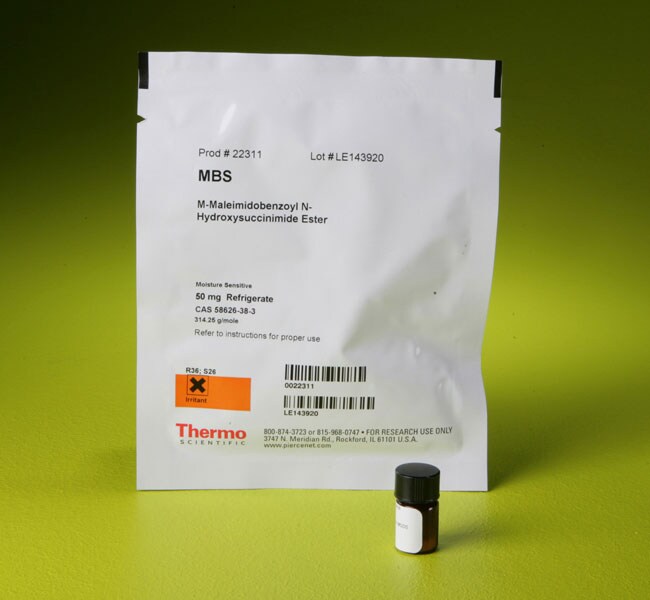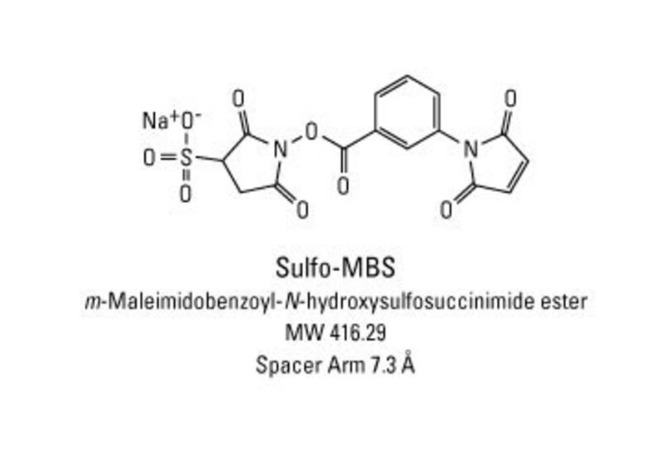Thermo Scientific™ Sulfo-MBS (m-maleimidobenzoyl-N-hydroxysulfosuccinimide ester)
Catalog No :
CAS Number :
Brand :
In Stock
Reactive groups: sulfo-NHS ester and maleimide
Reactive towards amino and sulfhydryl groups
Non-cleavable
Water-soluble (compared to MBS)
Membrane impermeable, allowing cell surface labelling
Specifications:
| Application | Protein Biology | ||
| Storage Temperature | -20°C | ||
| Product Type | Laboratory Chemical | Forms | Solid |
| Product Brand | Thermo Fisher Scientific™ | ||
| Product Grade | Molecular Biology | Formula | C₁₅H₉N₂O₉S·Na |
Thermo Scientific™ Sulfo-MBS is a water-soluble, heterobifunctional crosslinker designed to covalently link amine-containing biomolecules (e.g., proteins, peptides) to sulfhydryl-containing molecules through stable amide and thioether bonds. It features two distinct reactive groups: Sulfo-NHS ester (for amine groups) and maleimide (for sulfhydryl groups), allowing selective and efficient conjugation in aqueous environments.
Key Features & Benefits:
- Water-soluble: Eliminates the need for organic solvents, simplifying use in aqueous biological applications.
- Membrane-impermeable: Ensures labeling is restricted to cell surface proteins when used in cellular applications.
- Non-cleavable: Forms permanent, stable amide and thioether bonds resistant to cleavage.
- Specificity: Sulfo-NHS reacts with primary amines (-NH₂) in proteins, peptides, or biomolecules; maleimide selectively reacts with thiols (-SH), minimizing side reactions.
- Short spacer arm (7.3 Å): Maintains close proximity between conjugated biomolecules, ideal for applications requiring minimal molecular distance.
Applications:
- Bioconjugation & Labeling:
- Crosslinking antibodies, enzymes, and fluorescent probes for ELISA and Western blot detection.
- Covalent attachment of proteins to solid-phase surfaces for biosensors and immunoassays.
- Linking small molecules, drugs, or nanoparticles to proteins for drug discovery and development.
- Protein-Protein & Protein-Peptide Crosslinking:
- Studying receptor-ligand interactions, protein complexes, and enzyme-substrate dynamics.
- Antibody-drug conjugate (ADC) development for targeted therapies.
- Cell Surface Labeling & Imaging:
- Conjugating fluorescent probes or biotinylated molecules to extracellular proteins for imaging studies.
- Functionalizing nanoparticles or liposomes for targeted delivery.
- Nanotechnology & Biotechnology:
- Functionalizing magnetic beads, gold nanoparticles, or quantum dots for molecular detection.
- Engineering biomaterials for biosensors and diagnostic platforms.
Specifications:
| Attribute | Details |
|---|---|
| Chemical Reactivity | Amine-to-sulfhydryl |
| Reactive Groups | Sulfo-NHS ester & Maleimide |
| Molecular Weight | 416.29 g/mol |
| Spacer Arm Length | 7.3 Å |
| Water Solubility | Yes |
| Membrane Permeability | No (suitable for surface labeling) |
| Form | Powder |
| Storage Condition | -20°C, desiccated |
| Shipping Condition | Ambient temperature |
| Quantity | 50 mg |
| Crosslinker Type | Heterobifunctional |
Comparison with MBS (Non-Sulfo Version):
- MBS (m-Maleimidobenzoyl-N-hydroxysuccinimide ester) is not water-soluble and requires organic solvents such as DMF or DMSO for dissolution.
- Sulfo-MBS is pre-activated with a sulfonate (-SO₃) group, making it hydrophilic and ideal for aqueous reactions.
Handling & Storage:
- Store desiccated at -20°C to maintain stability.
- Dissolve in buffer immediately before use to prevent hydrolysis of reactive groups.
- Use within a short time after preparation to ensure maximum reactivity.
Related Products:
- MBS (m-Maleimidobenzoyl-N-hydroxysuccinimide ester) – Non-water soluble counterpart for organic-phase reactions.
- Sulfo-SMCC (Sulfosuccinimidyl 4-(N-maleimidomethyl)cyclohexane-1-carboxylate) – Another water-soluble amine-to-sulfhydryl crosslinker with a longer, more rigid spacer arm.
- BS³ (Bis-sulfosuccinimidyl suberate) – Amine-to-amine crosslinker for protein conjugation.
Thermo Scientific™ Sulfo-MBS is an essential crosslinker for protein conjugation, antibody labeling, and nanomaterial functionalization in aqueous environments. Its water solubility, selective reactivity, and stable linkage formation make it highly suitable for applications in bioconjugation, drug development, immunoassays, and molecular imaging.




 0
0



